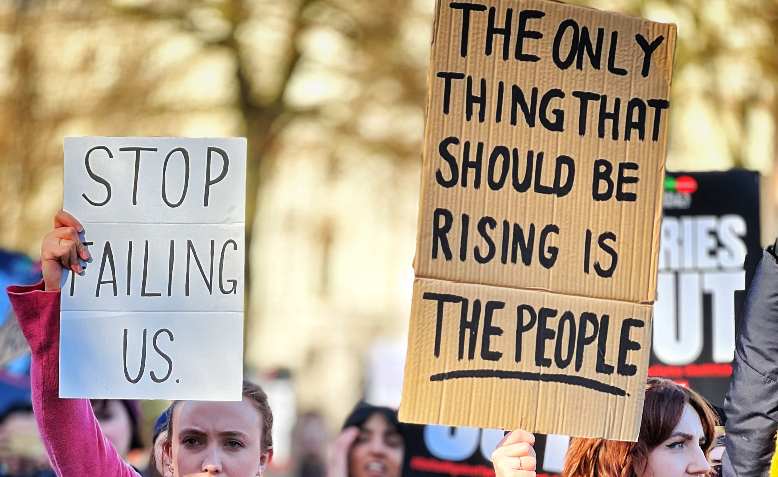 People's Assembly cost of living protest. Photo: Garry Knight
People's Assembly cost of living protest. Photo: Garry Knight
The opposition to the attack on working people and the drive for more war – which go hand in hand – will come from the streets
The cost of living crisis is really starting to bite. The government’s response, meanwhile, is totally inadequate.
Household fuel bills are soaring, with huge hikes in gas and electricity prices now taking effect. This combines with rising inflation generally to make it harder for most people to maintain their living standards. We are currently seeing the biggest fall in working-class living standards for decades.
The Office for National Statistics (ONS) has reported that 25% of those it surveyed are struggling to pay their bills, while 17% of respondents were resorting to loans or credit card borrowing to meet basic costs. That ONS snapshot was taken before April’s rise in fuel bills and before the 1.25% increase to national insurance contributions.
It is estimated that 5 million households are now experiencing ‘fuel stress’. This is forecast to rise to over 6 million soon. Fuel stress or fuel poverty is when people spend at least 10% of their family income merely on energy bills.
Cancer charity Macmillan has reported that hundreds of thousands of cancer patients are cutting back on heating, meals and essentials because of the cost of living crisis, putting their lives at risk. It reported that some people recovering from chemotherapy are sleeping in cold bedrooms because they can’t afford rising energy costs and others are skipping meals.
There is still big money, though, in banking and business. NatWest reported a 40% rise in its profits compared to a year earlier, reporting £1.2 billion pre-tax profits for the first quarter of 2022. The Tories could increase taxes on banks and corporations, but they are committed to protecting the wealthy elites.
The government is determined to hold down pay, with offers to public-sector workforces that are well below inflation. It has also resisted calls to increase Universal Credit in line with inflation, despite it being the poorest who are hardest hit by the current rises. The Resolution Foundation, a think tank, has suggested a rise of 8.1% instead of 3.1% to reduce the numbers plunged into poverty.
Ludicrously, Tory ministers were instructed to find ‘non-fiscal’ ways of addressing the crisis. That means ‘without costing any money’. It led to absurdly trivial and gimmicky suggestions like only getting an MOT for your car once every two years, instead of annually, and reminding phone and broadband companies to alert their customers to cheaper packages.
Political choices are being made that protect the richest while allowing the majority to struggle – and the poorest to suffer most. New wealth taxes could generate the money needed to alleviate the effects of the crisis. A genuine living wage, significant pay rises for public-sector workers and social security increases that at least match inflation, are all measures the government could adopt. They would all make a difference.
It is obvious that the government is utterly disconnected from the reality of many millions of working-class people’s lives. But there is little real alternative coming from Keir Starmer’s Labour, which has called for some piecemeal changes, but failed to offer a strategy that meets the scale of the crisis. Labour has recently been more concerned with attacking its own left wing, and rallying behind the government and Nato on the Ukraine war, than mounting serious opposition to the government.
There is a rock solid bipartisan consensus between the Tories and Labour on Ukraine. Both parties agree on pouring arms into Ukraine, strengthening military alliances, increasing military spending, and threatening escalation. Both parties have been strong on indulging in dangerous rhetoric and weak on constructively working towards diplomatic solutions.
The left needs to offer an alternative on both the war and the cost of living crisis. We need to be consistent in opposing imperialism east and west, condemning moves towards military escalation from the UK and its Nato allies, as well as maintaining principled opposition to Russia’s horrific war.
In domestic politics, we need to resist the attempts to make working-class people pay for the crisis, advocating policies like a serious living wage, higher pay, Universal Credit rises, public ownership of the energy sector and rent caps in the housing sector to protect the great majority.
Labour offers less and less. The opposition to the government comes from social movements, trade unions and the radical left. The TUC national demonstration on 18 June ought to be a converging point for all those who want to kick back against a discredited Tory government.
We need more collective action by trade unions, especially on pay, and a nationwide street movement through the People’s Assembly to pull together the different strands of opposition. At the same time, we have to build the Stop the War Coalition as a broad movement against the drive to further war.
From this month’s Counterfire freesheet
Before you go
Counterfire is growing faster than ever before
We need to raise £20,000 as we are having to expand operations. We are moving to a bigger, better central office, upping our print run and distribution, buying a new printer, new computers and employing more staff.

